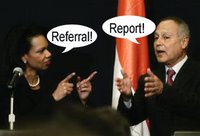Condoleezza Rice and Egypt's foreign minister 'differ'
"We should give Hamas time," Foreign Minister Ahmed Aboul Gheit said. "I'm sure that Hamas will develop, will evolve. We should not prejudge the issue."
That was not the message Rice had hoped to hear from Egypt, an important U.S. ally and Arab powerbroker. The U.S. has praised Egypt for telling Hamas it must moderate its views now that it has won elections for control of the Palestinian parliament.
Rice, making her first trip to the region since last month's Hamas victory, stood alongside Gheit as he spoke.
"If the new Palestinian government led by Hamas is going to be able to meet the aspirations of the Palestinian people for a peaceful life, for a better life, for a life in which there's economic development, it goes without saying that you cannot have one foot in the camp of terror and the other foot in the camp of politics," Rice said during a crowded and sometimes raucous press conference with Gheit.
The United States and the European Union consider Hamas a terrorist group and say they will have no official dealings with its members, complicating both international aid and the future of the Israeli-Palestinian peace process.
The Bush administration's difficulties seeding political freedom in the Middle East were also on display, despite Rice's repeated assurances that her critiques of "disappointments and setbacks" on the path to Egyptian democracy were offered in candor and friendship.
Rice and Gheit interrupted one another, politely at first, but later with an edge. When Rice called the case of jailed political opposition figure Ayman Nour one of Egypt's setbacks, Gheit's face tightened.
"Due process has been applied," Gheit said coolly, referring to Nour's recent appeal of a stiff prison term on what the Bush administration has called flimsy charges.
Rice and Gheit also differed over the specifics of international action on Iran, although they agreed on the dangers posed by Iran's disputed nuclear program.

The U.N. nuclear watchdog agency voted this month to send Iran's case before the powerful Security Council, which could levy sanctions on the Islamic regime.
The United States says there is no difference between the terms "report" and "refer" when sending a nuclear dossier to the Security Council, but other countries have suggested that a referral carries more weight.
"It is not a referral," Gheit said, raising his index finger.
"In fact, it is," Rice quickly replied.
"There we differ," Gheit said with a smile. Read more






<< Home